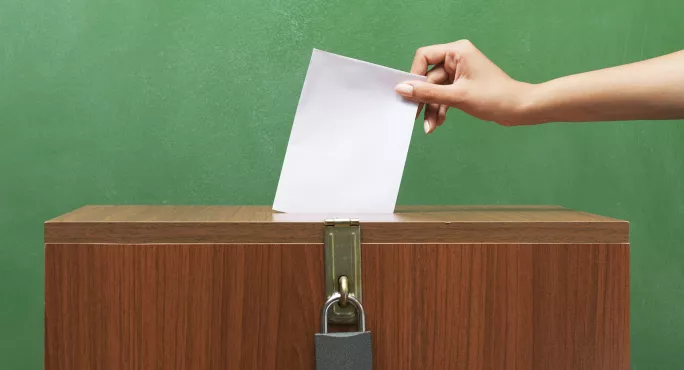NEU to launch indicative ballot over 2.8% pay rise recommendation

The NEU teaching union is launching an indicative ballot over the Department for Education’s recommendation of a 2.8 per cent pay rise for 2025, it has announced.
Teachers will be asked whether they are willing to take industrial action if the government does not “commit to a significant and fully funded pay rise above what has currently been outlined”.
General secretary Daniel Kebede warned that the government’s pay recommendation was “not sufficient to even start to address the crisis in recruitment and retention” of teachers.
The NEU will start an indicative ballot of members on 1 March, and it will close on 11 April.
The union said this would gauge the strength of feeling “about the government’s recent recommendation to the School Teachers’ Review Body (STRB) of an unfunded 2.8 per cent pay rise for teachers in 2025-26”.
If members show a willingness to take industrial action, then the NEU national conference - which will be held between 14-17 April this year - will make the decision to proceed to a formal ballot in the summer term.
The NEU said the government have plenty of time to stop this by “committing to a significant fully funded pay rise”.
Responding to the NEU announcement, Downing Street has urged teachers not to “put children’s learning at risk” by going on strike.
And the Department for Education has described the NEU’s move as an “extraordinary decision”.
Problems with pay ‘far from resolved’
Mr Kebede said: “The government must face up to the fact that the problems in teacher pay are far from resolved. Since 2010 pay for teachers in England has declined by a fifth.
“The profession no longer attracts enough graduates to keep up with the soaring vacancies.
“The suggestion that an unfunded pay award can be paid for by making ‘efficiencies’ is an insult to a profession who have already endured 14 years of austerity. No teacher or leader will be able to identify efficiencies without cutting staff or resources or both.
“This is a fact that the government knows only too well. After years of cuts to funding, there is nothing left in the coffers.”
- Background: DfE recommends 2.8% teacher pay rise for 2025-26
- Teacher pay rise: DfE aims to announce 2025 teacher pay award in April
- Pay scales 2024-25: What will your salary look like?
Asked if the government was worried about potential strike action by teachers following the NEU’s announcement of an indicative ballot of its members over pay offers, a No 10 spokesperson said: “As we continue to tackle unacceptable levels of school absence after millions of school days lost through both the pandemic and recent industrial action, we call on unions not to put children’s learning at risk and to put pupils’ interests first.
“We have been clear that future pay awards must be fair to both taxpayers and workers, especially when we are faced with unprecedented, inherited challenges, and the £22 billion black hole in the public finances.
“2.8 per cent is above the OBR’s [Office for Budget Responsibility] inflation forecast for this year, and in the last three years teachers have had a combined pay increase of more than 17 per cent.”
The DfE recommended a 2.8 teacher pay rise for 2025 in its evidence to the STRB, which was published in December.
The submission said many schools would need to supplement their funding for 2025-26 “with efficiencies” to cover a 2.8 per cent award.
At the time, Mr Kebede said the NEU was “putting the government on notice” over the recommendation.
Similarly, Pepe Di’Iasio, general secretary of the Association of School and College Leaders, said the recommendation of 2.8 per cent was “extremely disappointing” in December.
All unions warned that a 2.8 per cent pay award would not be enough to address the teacher recruitment and retention crisis.
Teacher strikes
The next step of the process is for the STRB to make a recommendation on the pay rise.
For this year, the incoming Labour government accepted the STRB’s recommendation of 5.5 per cent in July after the DfE - under the previous government - had recommended a lower pay rise than previous years.
In March last year, after the DfE recommendation, NEU members voted overwhelmingly in favour of strike action in an indicative ballot.
However, NEU members then voted against moving to a formal ballot on strike action in April last year and instead voted in favour of a snap poll once the formal pay offer was made.
In 2023, the former government faced months of strike action from teachers until they eventually accepted a 6.5 per cent pay offer.
The DfE has said previously that it is hoping to announce the final pay rise “as soon as possible after April 2025”.
This was after repeated complaints from schools that the late nature of this year’s pay award made it difficult for them to plan budgets.
For the latest education news and analysis delivered every weekday morning, sign up for the Tes Daily newsletter
Keep reading for just £1 per month
You've reached your limit of free articles this month. Subscribe for £1 per month for three months and get:
- Unlimited access to all Tes magazine content
- Exclusive subscriber-only stories
- Award-winning email newsletters
topics in this article



